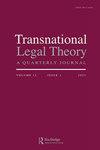Restoration and cooperation for flourishing socio-ecological landscapes
Q2 Social Sciences
引用次数: 5
Abstract
ABSTRACT Environmental law is ontologically committed to competition. This is evidenced by its use of framing concepts like sustainability which assume that landscapes have always had the carrying capacity to regenerate on their own. The Anthropocene, if anything, points to the deep entanglements that exist in nature and for human beings. Whilst competition explains evolutionary trends, there is much evidence pointing to the idea that cooperation and symbiosis amongst living things is a much better indicator of long-term change in the natural environment. Deep entanglements are better supported through cooperation than competition. Drawing on ideas from scientific research on symbiosis, this paper argues that environmental law is missing deep ontological commitments to cooperation between human beings and the natural world. Restoration, approached not just as a technical rules-based response to damage and degradation, but as an activity requiring cooperation with the natural world would potentially better support flourishing socio-ecological landscapes.恢复和合作繁荣社会生态景观
环境法在本体论上致力于竞争。这一点可以从它使用的可持续性等框架概念中得到证明,这些概念假设景观始终具有自我再生的承载能力。如果有什么不同的话,人类世指出了自然界和人类之间存在的深刻纠葛。虽然竞争可以解释进化趋势,但有很多证据表明,生物之间的合作和共生是自然环境长期变化的更好指标。通过合作而不是竞争来更好地支持深层次的纠缠。本文借鉴共生科学研究的思想,认为环境法缺少对人类与自然世界合作的深层本体论承诺。恢复不仅是一种基于技术规则的应对破坏和退化的措施,而且是一种需要与自然世界合作的活动,这可能会更好地支持繁荣的社会生态景观。
本文章由计算机程序翻译,如有差异,请以英文原文为准。
求助全文
约1分钟内获得全文
求助全文
来源期刊

Transnational Legal Theory
Social Sciences-Law
CiteScore
2.10
自引率
0.00%
发文量
7
期刊介绍:
The objective of Transnational Legal Theory is to publish high-quality theoretical scholarship that addresses transnational dimensions of law and legal dimensions of transnational fields and activity. Central to Transnational Legal Theory''s mandate is publication of work that explores whether and how transnational contexts, forces and ideations affect debates within existing traditions or schools of legal thought. Similarly, the journal aspires to encourage scholars debating general theories about law to consider the relevance of transnational contexts and dimensions for their work. With respect to particular jurisprudence, the journal welcomes not only submissions that involve theoretical explorations of fields commonly constructed as transnational in nature (such as commercial law, maritime law, or cyberlaw) but also explorations of transnational aspects of fields less commonly understood in this way (for example, criminal law, family law, company law, tort law, evidence law, and so on). Submissions of work exploring process-oriented approaches to law as transnational (from transjurisdictional litigation to delocalized arbitration to multi-level governance) are also encouraged. Equally central to Transnational Legal Theory''s mandate is theoretical work that explores fresh (or revived) understandings of international law and comparative law ''beyond the state'' (and the interstate). The journal has a special interest in submissions that explore the interfaces, intersections, and mutual embeddedness of public international law, private international law, and comparative law, notably in terms of whether such inter-relationships are reshaping these sub-disciplines in directions that are, in important respects, transnational in nature.
 求助内容:
求助内容: 应助结果提醒方式:
应助结果提醒方式:


